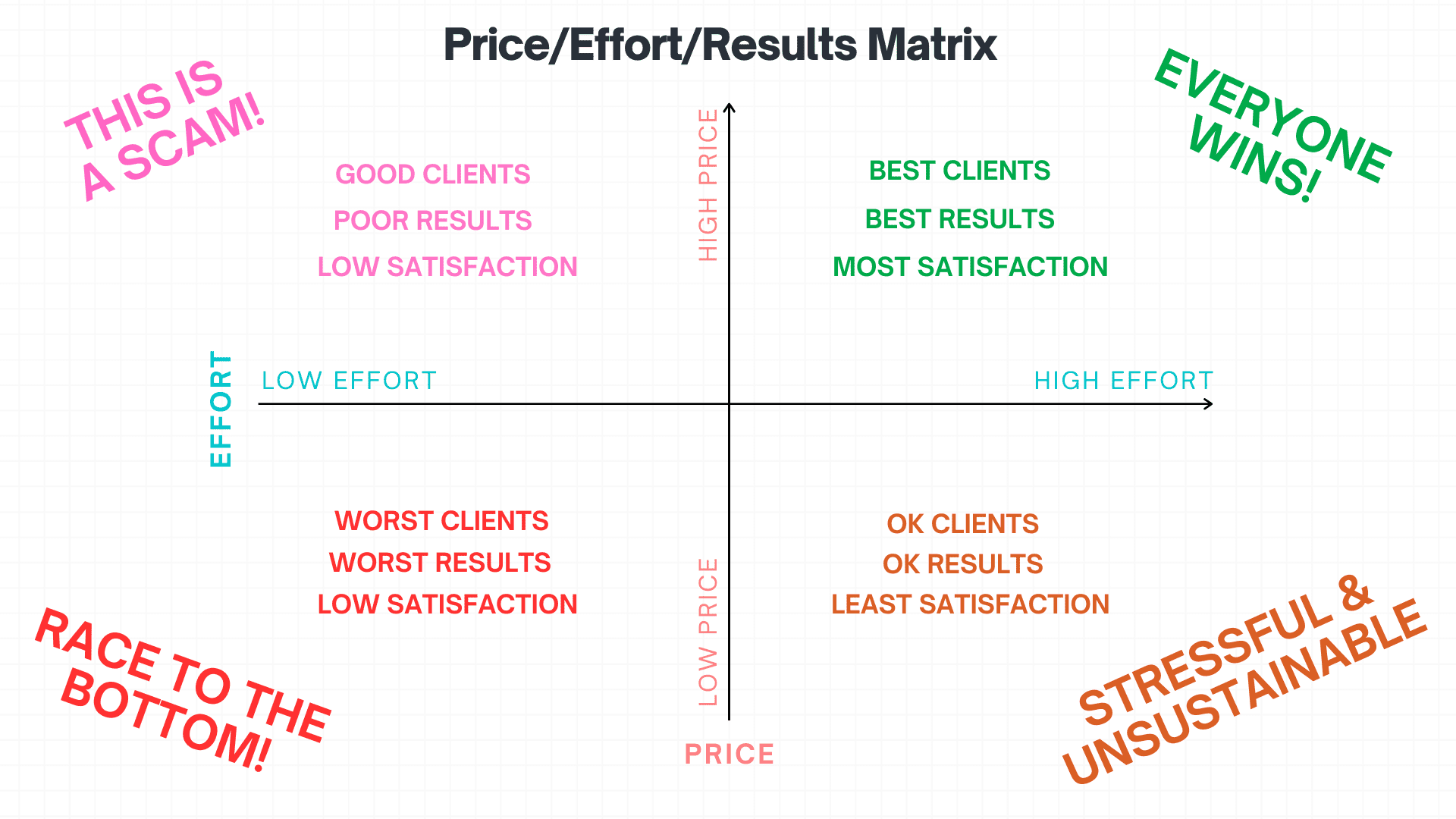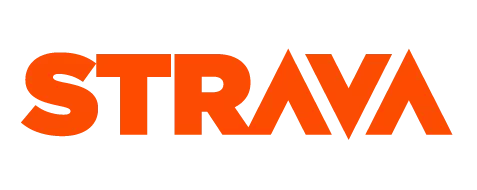One of the biggest mistakes coaches make is underpricing their services. I see it everywhere, coaches promoting the high quality of their service but charging cheap prices.
Cheapest and best? Nup, there is no such thing. Highest and Best is real.
The hard truth: you can’t be cheapest and best. If you’re trying to offer the best for the lowest price, you're setting yourself up for burnout, dissatisfaction, and ultimately, failure.
Here’s why it doesn’t work.
High-quality coaching and rock-bottom prices just don't mix. If you try to maintain top-notch service while charging low prices, you'll quickly find yourself stretched too thin. Quality coaching requires time, energy, and resources to tailor programs, offer personalized support, and stay updated with the latest training methods. When you undercharge, you can't afford to invest in these essentials, and that inevitably leads to a decline in the service you provide. In the long run, both you and your clients suffer.
Good customers are realistic, and low prices are a signal of low quality. It’s pointless to pretend you can give the best of both worlds. Most of the time you’ll get the worst of both.
If you prefer audio, you can listen to the audio version on the podcast, or use the embedded player below, or watch the video on Youtube or below
Lowest Prices Worst Clients
When you price your services too low, you end up attracting clients who are more focused on getting a bargain than on achieving their goals. These clients will not fully appreciate the value of what you offer and are more likely to be demanding, difficult to please, and less committed to the training process. They expect the world for a discounted rate, draining your energy and time with little return.
Highest Prices Best Clients
On the flip side, clients who are willing to pay for top-quality coaching are more invested in their own success. They understand the value of what they’re paying for and are easier to serve because they trust your expertise and are committed to following your guidance. These clients are motivated, more likely to see results, and more likely to refer you to others who appreciate quality coaching. By matching price to quality, you not only attract better clients but also create a more fulfilling and sustainable coaching business.
Same Effort More Returns
Endurance coaching is a personal, one-on-one service that demands time and attention for each individual athlete. Unlike mass-produced products, your costs don’t decrease with more clients. If you’re going to invest this level of effort, it makes sense to charge a higher price. By doing so, you can work with fewer clients while still achieving the same revenue, allowing you to focus more on each athlete and deliver the high-quality coaching they deserve. This is also motivating for you as the coach, when you price high, you put yourself under pressure to deliver. Pressure is great catalyst for success.
The "Coaching Price Effort Matrix" show what the results are when you measure the price you charge vs the effort you put into your clients. Price is on the Y access here, with Effort on the X axis.
Why Are Coaches Underpricing Their Services?
Let’s dive into why so many coaches fall into the trap of pricing themselves too low.
1. Charging what They Would Pay
One common pricing mistake coaches make is setting their rates based on what they themselves would pay, rather than what their services are actually worth. This mindset often leads to underpricing and undervaluing your expertise. As a coach, you’re deeply invested in your work, and you might have a different perspective on spending compared to your clients. What you would pay for coaching isn’t necessarily what your ideal client would pay. Many athletes are willing to invest significantly in their training if they believe it will help them reach their goals.
2. Lack of Confidence and Fear of Rejection
Imposter syndrome is real, and it hits coaches hard. If you’re not confident in the value you provide, you might think you don’t deserve to charge more. But underpricing can undermine your business and your confidence even further. Remember, your knowledge, experience, and the results you deliver are worth more than you might think. It’s easy for coaches to convince themselves that they want their services to be “accessible” but this is probably just a trick you are playing on yourself, a crutch to protect our egos and to avoid “failure”.
3. Market Comparison
It’s easy to look at what other coaches are charging and feel pressured to match or undercut their prices. But this kind of comparison rarely takes into account the differences in experience, specialization, and client base. Your coaching is unique—don’t dilute it by trying to compete on price. Instead, use the comparison as an advantage by pricing significantly higher than your competitors. This will be a signal to the best clients that your services are head and shoulders above the others.
4. Comparing to Template Plans or Coaching Apps
Another reason coaches often underprice their services is by comparing themselves to template plans or automated coaching apps that offer self-guided training at a low cost. It’s tempting to lower your prices to compete, but this approach only invites unfavorable comparisons. When you price your services too close to these automated options, potential clients might see your coaching as just a slightly better version of a pre-made plan or an app. Instead, you should set your prices higher to reflect the personalized, hands-on guidance and expertise that only a dedicated coach can provide. This way, you clearly separate yourself from the impersonal, one-size-fits-all approach of automated solutions, and attract clients who value individualized, high-quality coaching.
5. Misunderstanding of Value
Some coaches believe that lower prices make their services more accessible. While accessibility is important, it’s crucial to understand that value isn’t about affordability. It’s about what you give vs what you get—your expertise, your personal attention, and the results you help your clients achieve. When you charge what you’re worth, you’re also able to deliver the best possible service.
6. Fear of Losing Clients
Coaches might worry that raising prices will scare off their current clients. But think about it this way: if your clients are truly benefiting from your coaching, they’ll recognize the value in paying more for continued success. Plus, clients who appreciate and respect your value are the ones who will refer you to others who do the same.
The Bottom Line
The cheapest coach isn’t the best, and the best coach isn’t the cheapest. If you’re underpricing your services, you’re doing yourself—and your clients—a disservice. It’s time to take a hard look at what you’re offering and set your prices accordingly. Your expertise, time, and the results you help clients achieve are worth it.
Remember, your coaching business isn’t just about surviving; it’s about thriving. And that starts with charging what you’re truly worth.
Take our Free "Authentic" Marketing Course for Coaches
Designed for endurance sport coaches. Marketing doesn't need to be pushy. The best marketing simply creates a win-win relationship between you and your customers. Take the simple 6 part course to learn more.














